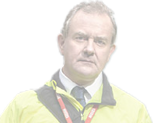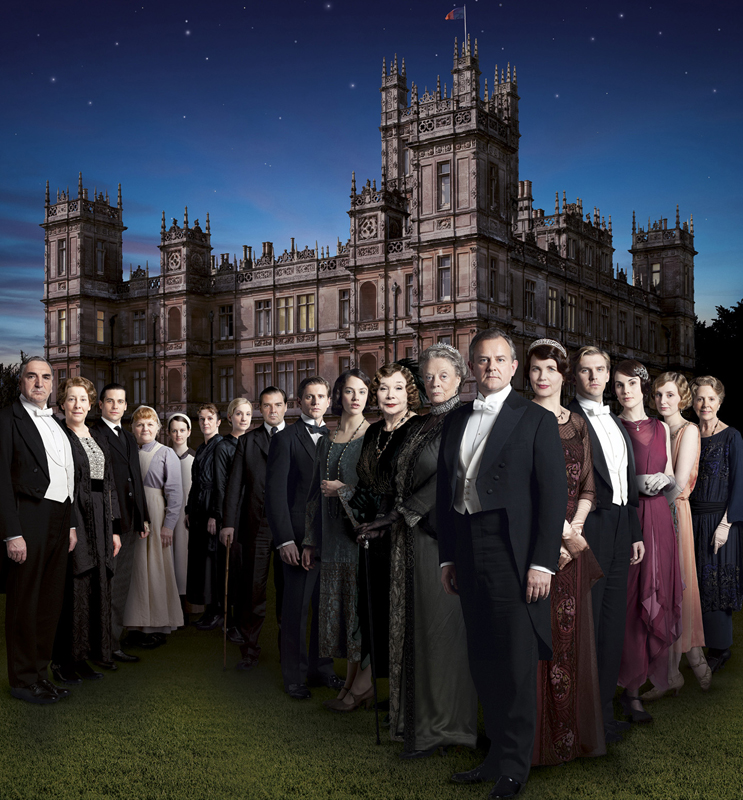Interview by Jace Lacob for The Daily Beast
Downton Abbey viewers are anxiously awaiting Season 3 of the addictive British costume drama—which arrives on U.K. television on Sunday (although not until Jan. 6 in the U.S., when it returns to PBS’s Masterpiece)—searching for televised methadone to tide them over until Downton Abbey’s third season kicks off.
One problem: there isn’t really another show like Downton Abbey on television. Between the exquisite costumes and lavish sets (including real-life Highclere Castle), the now-familiar characters and turbulent plots, Downton Abbey has captured the imagination of a broad range of viewers on both sides of the Atlantic.
Season 3 of Downton Abbey will unfold over roughly two years, but unlike in previous years, Season 3 won’t be structured around historical events like the sinking of the Titanic, the start of World War I, or the Armistice.
“It’s not bookended in that way,” creator Julian Fellowes told The Daily Beast. “One of the reasons for starting with the Titanic is that it’s a piece of shorthand. If you start something with the Titanic going down, everyone in the world knows we’re just before the First World War. It’s symbolic, and you don’t have to waste any scenes on exactly where you are in history. But we don’t need that anymore. It’s really about the personal journeys, in a way, of the characters.”
Those journeys will reflect how the war changed the residents of Downton Abbey, both upstairs and below stairs, in palpable ways, picking up the action shortly after Matthew (Dan Stevens) proposed to Lady Mary (Michelle Dockery).
“We go back about three months later,” Fellowes said. “We’ve lost no time at all. They’re still trying to decide how much of their life will survive, how much will go back to normal, and how much has been changed forever. Within the family, there has been certain change. Sybil is married to an Irish rebel chauffeur and living in Dublin, and that’s never going to go back to the way it was.”
“Cora is, in a way, less afraid of change than Robert,” he continued. “She’s come from a different tradition. Her father was an American self-made businessman. She’s not an American aristocrat, so she has a totally different feeling about all this … As far as she’s concerned, she doesn’t care if things are going to have to change. You’ve got all those different tensions because the security of the pre-war world has gone.”
According to Hugh Bonneville, the mood has changed in the third season, following both the war and the Spanish flu, both of which claimed the lives of some of the show’s characters.
“It’s still a period of mourning,” Bonneville said. “There’s a sense of Downton re-finding its feet and perhaps trying to keep the focus back on the family and keeping the outside world at bay. They’re trying to re-bond as a family, both upstairs and down.”
But the outside world has a way of creeping in. “There are different problems now on the horizon,” he continued. “A lot of these estates ran into huge financial difficulties, and had to reassess their position after a whole generation was wiped out. They don’t have the gilded relaxation or the certainties that they had before the war. It’s a modern world and Robert’s got to face that, and it’s Matthew’s generation that’s going to have to start gently telling the old boys that things are going to change.”
Might Downton Abbey be one of those estates in jeopardy after the war? “We certainly see some financial wobbles,” Bonneville said. “Downton is in a perilous state as we open the season for various reasons. And, well, my mother-in-law comes to visit, and she’s got cash, so there’s always hope.”
Viewers who thought that Downton Abbey’s Christmas Special had tied up all of the various narrative strands—between Matthew and Mary’s engagement, Sybil’s pregnancy, and Bates’s suspended sentencing—will still be in for more than a few surprises along the way.
“There is the huge unexploded bomb of Bates,” said Bonneville. “Was he guilty? Now that he’s not going to hang, will he stay in prison forever? Anna will be the sleuth who tries to track down what actually happened … There are still plenty of tensions within these romances. Life still has a tendency to throw out problems along the way.”
The Daily Beast talked with the show’s cast, as well as Julian Fellowes and executive producer Gareth Neame, about what’s coming up on Season 3 of Downton Abbey, from the arrival of Shirley MacLaine’s Martha Levinson to the issues ahead for Matthew and Mary. Plus, “Anna Bates investigates!”
WARNING: SPOILERS AHEAD!
Matthew (Dan Stevens) and Mary (Michelle Dockery):
It’s not all happily ever after for this star-crossed pair. “Although they have the engagement at the end of the last episode, they are two very, very forceful characters in their own right,” said Neame. “It will always be a very volatile relationship. There will always be some spark in it.”
Dockery agreed, and hinted that Matthew and Mary may not make it to the altar in the end. “It’s not plain sailing with Matthew and Mary,” she said. “Downton comes into trouble financially and Matthew discovers that he could inherit money from Lavinia’s father and he’s too proud to take the money because she passed away. Mary’s saying, well, you can save Downton if you go through with this. There’s a lot of disagreement between them. Whether they get married or not, I’m not going to give that away.”
“I just love that Julian hasn’t said it’s all perfect now and they’re smiling and skipping along around the estate,” continued Dockery. “It’s like any kind of relationship. It’s not always easy.”
Viewers will see a far more determined Mary this season as well. “She knows what she wants,” Dockery said. “She is determined to see it through with Matthew and to not in any way jeopardize their relationship. She adores him. She’s made her mistakes with the diplomat and then Richard Carlisle and now she’s finally settled and she’s really grown up. She’s matured in the past three years.”
As for whether Mary has truly escaped the Mr. Pamuk affair, which finally came out during the Christmas Special, that remains to be seen. “Of course a scandal doesn’t just blow away like it does now,” said Fellowes. “Now, you sell your story to the Sunday papers and then just move on. But we haven’t heard the last of Mr. Pamuk.”
Sybil (Jessica Brown Findlay) and Branson (Allen Leech):
When viewers last heard of Sybil and ex-chauffeur Tom Branson, the two had gotten married in Ireland and Sybil had sent a letter to say that she was pregnant, while Branson was working as a journalist. But their lives are about to be ripped open with the Irish Troubles, and the Crawleys are less than inviting when they return to Downton.
“Branson has changed and how he’s upstairs,” said Dockery. “His character is very much one of the core elements of the third series, because it’s very much about deference and he is now being spoken to in a different way. We call him Tom and not Branson and we keep [chastising] Violet for calling him Branson when she should be calling him Tom. Carson is furious that the chauffeur is now being waited upon and dressed.”
But while Carson (Jim Carter) can bluster about now being required to serve the man who once acted as family chauffeur, it’s Robert who has the biggest problem with Tom joining the family.
“While he can forgive Mary her indiscretion and naiveté, I think he finds the whole thing about Sybil and Branson much harder to stomach,” Bonneville said. “He sees Branson as a dangerous Republican firebrand … and more than that, they’ve eloped, pretty much. What really throws a cat amongst the pigeons is when they come over to England, as she’s approaching her final term of pregnancy. The social upheaval of having the chauffeur at our dining table creates a wonderful sequence of painfully nuanced social observations … Robert doesn’t really know how to cope and his bluster and his discomfort with this social change that’s been forced on him at his own dinner table is a microcosm that’s happening around the world, really. He doesn’t understand how this can happen. And it’s his bloody daughter’s fault.”
Violet (Dame Maggie Smith) and Martha (Shirley MacLaine):
The Dowager Countess meets her match this season in Cora’s mother, Martha Levinson, who arrives from New York just as the family faces a financial crisis.
“Martha is sort of a hurricane,” said Bonneville. “She is an extrovert, a fresh wind blowing through the slightly dusty hall of Downton … She’s a bit like Violet for all the wit and the barbs, and the fussiness of her world, but she’s actually a very shrewd woman with a big heart.”
Still, that doesn’t mean that these two battle-axes won’t clash. In fact, their philosophies mean that there will be war of words between the two.
“[Violet] is essentially nostalgic for the past,” said Fellowes. “She thinks everything’s getting worse, manners are falling apart, and everything was better when she was a girl … That is her central philosophy. Martha is the opposite. She thinks everything’s getting better. She thinks these new methods of transport, the money, the clothes are better. Everything’s better. So you have these two women, both of whom are quite muscular in the sense of their influence within the family, they’re both very strong, but they have diametrically opposite philosophies.”
Neame concurred. “We’ve had this idea of Violet as a dominant character that always wins out in anything that she does,” he said. “The idea of turning that on its head, where she can actually have an adversary of equal weight, is quite a delicious prospect.”
So, where does that leave Isobel (Penelope Wilton) in this battle of wills?
“She’s the third point of the triangle,” said Neame. She quite enjoys someone standing up to Violet because it’s what she does and usually loses. She isn’t at all hostile to Martha. But the battle is really between Martha and Violet. That’s the struggle for supremacy.”
Robert (Hugh Bonneville) and Cora (Elizabeth McGovern):
One of the more controversial subplots from Season 2 had Robert debating an affair with housemaid Jane (Clare Calbraith), only to rally back to Cora’s side when she nearly died from the Spanish flu.
“Robert has learned from his mistakes and won’t be doing it again,” said Bonneville. “But then, you never know. He’s always been a fair-minded man. That’s one of his endearing qualities, but his own mistakes mean that he’s slower to judge others, and that becomes quite an important theme in Series 3.”
Adultery aside, Robert and Cora will have their own challenges to face down this season, most notably the winds of change that move through the great estate.
“Change is easier for Cora to acclimate herself to because she comes from a background in a country that is made up of change,” said Elizabeth McGovern. “America is a very young country. When you meet Shirley MacLaine’s Martha it becomes evident that Cora is not someone whose family has had wealth for generations. They enjoy great wealth now, but you don’t get the impression that they have for years and years and years, unlike Robert’s family. It’s easier for her to get her mind around a changing world than it is for Robert, so that comes up as a stumbling block in their marriage.”
Mrs. Patmore (Lesley Nicol), Mrs. Hughes (Phyllis Hogan), and Mr. Carson (Jim Carter):
While the previous seasons of Downton have often found Mrs. Patmore and Mrs. Hughes as downstairs rivals—or at least when it came to accessing the pantry—Season 3 finds the two department heads, along with ever-vigilant butler Carson, growing closer. It’s logical, really: in a house as orderly as Downton, there would be a hierarchy below the stairs just as there would be above.
“Exploring Mrs. Hughes and Mrs. Patmore was a great way to go,” said Nicol. “They’re women of a similar age. There was a bit of fighting to begin with, but it makes sense that they would have a relationship of some kind, really.” The two become closer still when a health scare arrives at Downton, testing both their friendship and their individual fortitude.
It’s a storyline that also involves Carson, though he hovers uneasily on the periphery at first. “Carson doesn’t have an arc, he has a straight line,” said Carter. “He just wants things to stay the same. After the war, it’s mainly about getting the standards of the house back to the way they used to be pre-war, but that’s a bit like trying to get the toothpaste back into the tube. Carson struggles to change. He’s the guardian of tradition. That’s how he sees himself, and happiness is having a full complement of footmen at the dinner table. He sets himself on what presumably will be a losing battle of getting the standards back to the way they were.”
Thomas (Rob James-Collier) and Miss O’Brien (Siobhan Finneran):
James-Collier believes that Thomas is just misunderstood. “Everyone says he’s so evil and nasty, but I think that people have to appreciate this burden, this cross, that he has to bear, this secret,” he said. “His sexuality was punishable by a prison offense. It was against God, and if you were ever outed, that was the end of your career. You wouldn’t get a reference. You could essentially starve.”
Yet there was a bond between Thomas and Miss O’Brien, one rooted in being outsiders. Thick as thieves during Downton’s first two seasons, Thomas and O’Brien become adversaries in Season 3. While the reason behind their war seems clear enough—O’Brien is not happy that Thomas refuses to take her nephew Alfred Nugent (Matt Milne) under his wing, and Thomas sees Alfred as the subject of favoritism—things turn serious very quickly as O’Brien sets out to enact a chilly revenge against Thomas, now valet to Lord Grantham.
So is this the end of the dastardly duo and of a partnership that viewers love to hate? “We loved our smoking-plotting scenes, as we’d call them,” James-Collier said. “But if the series is going to have longevity, all of the characters’ relationships have to change… I think [O’Brien] is the cleverest beast in Downton Abbey… I think most people will be able to guess who comes out on top in that particular battle.”
As for specifics of what happens between the two, James-Collier was decidedly coy. “There is a series of gamesmanship and one-upmanship throughout the series where Thomas and O’Brien are trying to get the better of the other and it gradually develops into something a little more sinister, darker and grittier,” he said. “And it ends with one of them being completely destroyed.”
Daisy (Sophie McShera):
Viewers have seen Daisy transform from a timid scullery maid to a stellar cook in her own right, one with potential independence looming in front of her. McShera said that Daisy’s arc represents the possibilities suddenly becoming available for young women at the time. “Upstairs, there is all this stuff happening for women, all this social change, and it’s trickling down to the downstairs,” she said. “For Daisy, this girl who just wanted to get through the day and try not to get slapped by Mrs. Patmore, suddenly there’s ambition.”
Although Daisy may be a widow, she’s often just as naive and innocent as she was in the show’s early days. But that might be about to change this season. “Daisy’s finding her inner bitch,” said McShera. “She grows a bit power mad and then she gets a bit ambitious, but in a bad way.”
Daisy’s path towards professional advancement includes a brief strike, which plays more like a teen tantrum. “I loved all that,” she said. “It’s so much fun being stroppy, flouncing out of rooms and giving people dirty looks.” While her attempts to strike fail miserably, Daisy does get a bit of a career boost from Mrs. Patmore, even as her personal life once again flounders. “She’s getting very ambitious in her career, but she’s unlucky in love again,” McShera said. “She’s found someone straight [this time], but not interested.”
In fact, Daisy finds herself enmeshed in a complicated romantic entanglement that involves Alfred, new kitchen maid Ivy (Cara Theobold), and golden boy Jimmy (Ed Speleers). “It’s a quadrangle,” McShera said. “A hexagon! There’s millions in it.”
Anna (Joanne Froggatt) and Bates (Brendan Coyle):
Poor Bates may have been spared the hangman’s noose, but it doesn’t mean that this newly married couple will have days of wine and roses to come, given that he was sentenced to life imprisonment for the murder of the insidious Vera Bates (Maria Doyle Kennedy).
“Anna is going to do everything she can to try and get him out this year,” said Neame. The Crawleys, meanwhile, will stand by the second Mrs. Bates in her quest. “She is supported in her efforts,” said Fellowes. “It’s a tough row to hoe.”
Froggatt, meanwhile, teased that Anna will be in a much better place than when viewers last saw her. “You find them in a more positive state,” she said. “The relief of having Mr. Bates’ execution reprieved is huge and she has something to fight for again. She will fight until the death to free her man.”
Coyle agreed. “There was a good amount of hope represented by Anna, but prison life throws up its own challenges for Mr. Bates,” he said. “While he is in prison, she is what keeps him alive, keeps him going. In their scenes, there is delicacy, there is love, and there is hope. Is there a chance of happiness? Not while he’s in prison. Does he get out of prison? I can’t tell.”
As for what happens next to the beleaguered couple, Coyle came up with a rhyme that had Froggatt in hysterics: “Season 3 incarcerates Mr. Bates, and Anna Bates investigates. Does she liberate Mr. Bates? You’ll have to wait.”









